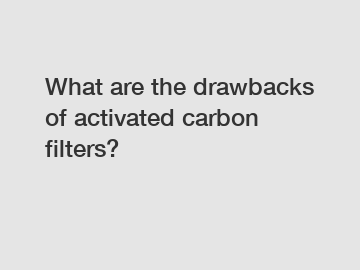What are the drawbacks of activated carbon filters?
Clean and safe drinking water is a fundamental requirement for maintaining good health. As awareness grows regarding the potential contaminants present in our water supply, many people turn to activated carbon filters as a popular solution. These filters, known for their ability to remove impurities, have gained immense popularity in recent years. However, it is crucial to recognize that even the most efficient technologies have their limitations. In this article, we will explore the drawbacks associated with activated carbon filters, shedding light on the factors that may affect their performance.
1. Limited Removal of Certain Contaminants:
Activated carbon filters are renowned for their efficacy in eliminating a wide range of chemical compounds, including chlorine, volatile organic compounds (VOCs), and some heavy metals. However, their effectiveness significantly diminishes when it comes to removing certain contaminants like fluoride, nitrates, and dissolved minerals. These compounds might pass through the filter without thorough purification, potentially compromising the water quality.

2. Short Filter Lifespan:
One prominent drawback of activated carbon filters is their relatively short lifespan. Over time, the activated carbon particles become exhausted, losing their adsorption capacity and filtering effectiveness. The lifespan of these filters varies depending on the brand, water quality, and quantity of water filtered. Regular maintenance and replacement are required to ensure optimal performance, adding logistical complications and additional costs for consumers.
3. Inefficient Removal of Microorganisms:
While activated carbon filters excel at removing chemicals and odors, they struggle to effectively eliminate microorganisms like bacteria, viruses, and protozoa. These tiny organisms can bypass the filter, posing potential health risks. If microbiological contamination is of concern, supplementary disinfection methods (such as ultraviolet or reverse osmosis systems) may be necessary in conjunction with activated carbon filters.
4. Variable Effectiveness Depending on Water Temperature:
Another limitation to consider is the temperature sensitivity of activated carbon filters. These filters tend to work best at room temperature and might experience reduced adsorption capacity when exposed to hot or cold water. It is essential to be mindful of such temperature variations, as they can impact the filter's performance.
5. Reduced Flow Rate:
Activated carbon filters are known to reduce the flow rate of water passing through them. As water molecules encounter the filter media, their path undergoes resistance, leading to slower filtration. This reduction in flow rate may be inconvenient when larger quantities of filtered water are required, such as during peak usage times or for larger households.
6. Ineffective Against Hard Water:
Activated carbon filters are not designed to address hard water issues caused by high levels of dissolved minerals, such as calcium and magnesium. While they may improve the taste and odor of hard water, they do little to eliminate the minerals responsible for limescale build-up and other potential problems associated with hard water.
Conclusion:
Activated carbon filters have undoubtedly revolutionized our approach to water filtration, offering a practical and affordable solution for removing a wide array of contaminants. However, it is crucial to acknowledge their limitations. They are most effective for removing organic chemicals and improving taste, but may fall short in eliminating certain impurities, microorganisms, and tackling hard water problems.
By familiarizing ourselves with these drawbacks, we can make informed decisions regarding additional water treatment methods that may be necessary to supplement activated carbon filtration systems. Balancing benefits and limitations, and factoring in specific water quality concerns will help ensure the provision of clean and safe drinking water for ourselves and our families.
Want more information on primary filter, Chemical processing activated carbon filter element, activated carbon filter element price? Feel free to contact us.
262
0
0

Comments
All Comments (0)